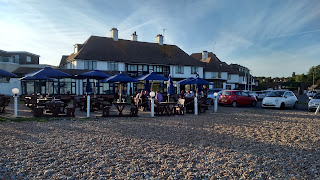 On Monday evening I attended the British Guild of Beer Writers Pre-Great British Beer Festival Reception. The event took place at the
Loose Cannon, a large cavernous establishment, housed in three adjoining and
rather imposing Victorian railway arches, directly underneath Cannon Street
station.
On Monday evening I attended the British Guild of Beer Writers Pre-Great British Beer Festival Reception. The event took place at the
Loose Cannon, a large cavernous establishment, housed in three adjoining and
rather imposing Victorian railway arches, directly underneath Cannon Street
station.
This was the first such function I have attended, having
only joined the Beer Writers Guild last year, and I have to say I really
enjoyed it. I’m not sure how many years this reception has been held for, but
it is traditionally regarded as the start of what for many is quite a beery
week. With the trade session taking place the following day at the Great British Beer Festival, followed by the festival opening its doors to the public the same evening, the event is an obvious prelude to a hectic five days of beer
sampling and enjoyment.
Unfortunately, unless I decide to pay an evening visit, I
won’t be going along to GBBF. With two recent foreign holidays under my belt,
and a couple of others in the pipeline, I am running low on annual leave. I am
not too bothered though, as in recent years I have found the event to be just
too large and way too crowded. With a reported 800 beers available at Olympia,
it is difficult to know where to start. It may seem perverse to say so, but
sometimes one can have too much choice!
 |
| The reception in full swing |
Returning to Monday evening’s get together, I arrived
shortly after the event opened its doors; having travelled up, by train,
straight from work. There was already quite a crowd present, including several
prominent people I recognised as representing the great and the good amongst
the UK’s beer
writing fraternity. Without wishing to name-drop too much, I spotted CAMRA Good
Beer Guide editor, Roger Protz, Guild Chairman Tim Hampson, veteran CAMRA
National Executive members, John and Christine Cryne, journalist, PR person and
beer blogger, Sophie Atherton, plus Michael Hardman, one of the original four
founders of the Campaign for Real Ale.
On a more personal level it was great to bump into fellow
long-serving CAMRA member and veteran beer blogger, Tandleman, who was in town
for his usual stint behind the foreign beer bar (Bieres sans Frontiers) at
GBBF. I also made my acquaintance with
Dave Bailey, who as well as running the innovative and successful Hardknott Brewery, up in the Lake District, is a fellow blogger of
repute. Later on, I spent some time chatting to Martin Kemp who, in partnership
with Rob Jones, ran the pioneering Pitfield Beer Shop, and later brewery, in
the Hoxton area of north London.
After the two won Champion Beer of Britain with Dark Star back
in 1987, Rob went on to form the Dark Star Brewery, which began life in the cellar
of the Evening Star pub in Brighton. The company are now one of the biggest
breweries in Sussex.
Martin stayed with Pitfield and in 2008 moved the brewery out to rural Essex,
as rents in London were becoming
uneconomic.He also runs a pub in Newmarket, Suffolk.
So what about the beer at the Pre-Great British Beer
Festival Reception? There was cask in the form of Dark Star, Ilkley, Okells and
Shepherd Neame, alongside an interesting collection of strong bottled beers
courtesy of, amongst others, the Left Hand Brewing Company of Longmont,
Colorado. Nitro, a 6.0% ABV
milk stout looked interesting, but I plumped for the excellent Black Jack
Porter. At 6.8% ABV, it certainly packed a
punch, but alongside this was a rich, dark chocolate porter, with bags of
flavour.
 |
| Packing a real punch - Black Jack Porter |
I didn’t start on these strong beers; instead I worked my
way up through several of the cask ales. Foremost was Summer a 4.0%, refreshing
dark golden ale from Ilkley Brewery, bursting with tropical fruit flavours.
This was the perfect beer to start on. I then moved on to The Invader, a 4.0%
Rye Pale Ale from the same brewery. This was another excellent beer which, as
its name suggests, includes a proportion of rye in the grist. I also tried two
beers from Isle of Man brewers, Okells; Saison 4.5% and
Manx Pale Ale (MPA) 3.5%. Shepherd Neame had a golden version of their
best-selling Spitfire Ale on sale, but I gave that one a miss.
An excellent, hot finger buffet was provided to help soak up
the beer, so all in all it was a really good evening. It was especially good to
meet up for a chat with Tandleman, and also with Dave Bailey and Martin Kemp. I
left shortly before 10pm, and caught
the train home from nearby Cannon Street
station. My thanks to the Cask Marque; the organisers and sponsors of the
function, and to the Guild members who helped stage the event. I will certainly
be booking my place for next year.


































